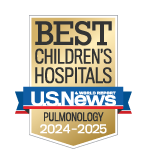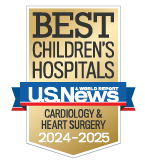Pulmonary Hypertension Clinic
Nationally ranked by U.S. News & World Report


The Pulmonary Hypertension Clinic at Children’s Mercy uses a team-based approach to help children with pulmonary hypertension receive the best possible care.
If your child’s care team suspects pulmonary hypertension (PH)—increased pressure in the vessels going from the heart to the lungs—they may refer your family to the Pulmonary Hypertension Clinic.
Your pulmonary hypertension care team
This clinic allows pulmonology specialists to collaborate with Children's Mercy cardiologists to diagnose and treat increased pressure in the blood vessels between a child's heart and lungs. The clinic allows families to see two specialists at once, with a nurse practitioner and coordinator to managed the complex needs of the child, from medication pre-approvals to ordering in-home equipment.
The pulmonary hypertension team provides consultations and care for Children’s Mercy who are in the hospital as well as regular outpatient clinics and coordination with home care services.
Whether you first connect with the pulmonary hypertension team when your child is in the hospital or at our outpatient clinic, you will continue to work with the same team going forward.
Conditions
We care for children with all types of pulmonary hypertension, including those with PH caused by:
-
Autoimmune disorders
-
Congenital heart conditions
-
Premature birth
-
Genetic disorders
-
Infection
-
Medications
-
Unknown factors
Pulmonary hypertension in children
Many families have found resources from the PHA to be helpful. This organization is also affiliated with the KC Pulmonary Hypertension Support Group.
Symptoms
Symptoms of pulmonary hypertension in children include:
-
Having to work harder to breathe, especially during activity
-
Failing to gain weight appropriately
-
Rapid heart rate
-
Decreased oxygen levels
-
Dizziness or fainting
Diagnosing pulmonary hypertension
Doctors usually diagnose pulmonary hypertension with a thorough ultrasound examination of the heart. In some cases, a cardiac catheterization allows the care team to better evaluate the pressures inside the heart.
Treatment options
Medications that relax the blood vessels going into the lungs can help the right side of the heart pump blood more effectively. These can be taken by mouth, or in some cases, given by infusion through an IV. Treatments that can also help your child with breathing may include:
- Supplemental oxygen
- Inhalers
- Steroid medications
